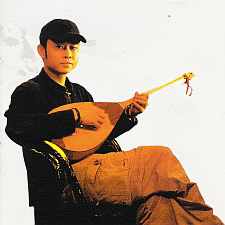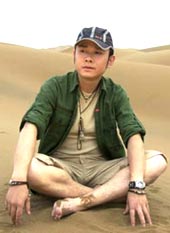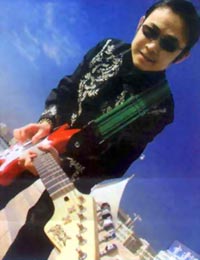Dao Lang - 刀郎 |
||||||
| Dao Lang is one of China's leading exponents
of modern folk music.By this we mean he takes traditional songs from otherwise
unknown regions of China, and turns them with great skill into modern
classics. Although originally from Sichuan Province, much of his music reflects the people and cultures of Western China, most notably Xinjiang Province, Qinghai Province, and the music of the Uygur's. He also spent time in the Gobi Desert learning local songs, which he later transformed in presentation for the general listeners ear. Dao Lang claims to have toured the Chinese cities of Chengdu, Chongqing, and Xi'an, as well as the autonomous region of Tibet for more than four years as a young bar-hopping musician. Unlike many eastern artists, he shy's away from publicity and prefers instead to let his music do the talking. Therefore there is little information about him, so we have drawn of the resources of The Shenzhen Daily newspaper and Wikipedia. Dao Lang: I'm an Ascetic for Music As for his origins, people only know that he hails from Sichuan in southwestern China and is Han in ethnicity. But what is his life like? A reporter from Sichuan eventually interviewed him and learned something about him and of his understanding of music through his wife and friends. His real name is Luo Lin. His hometown is Luoquan Township in Zizhong County, Sichuan Province. On the way to success "Actually I am an ascetic in the world of music," Dao Lang said. "When I was 16 years old and had yet to graduate from secondary school, I went to the city of Neijiang to learn to play keyboard instruments. Two years later, I toured Chengdu, Chongqing, Tibet and Xi'an for more than four years as a bar-hopping musician. I did not spend a single day in a university. I met my wife in 1995 when I was a singer in Hainan. Her family name is Zhu and she is from Xinjiang. "When I arrived in Xinjiang with my wife, I knew nobody and didn't know what to do. So my wife let me listen to music for a pastime. The music from Xinjiang inspired me so much that I decided I would do something. I published a disc of sundry pop music in 2001. But only a little more than 2,000 discs were sold. I buried myself in a library for many days after this failure. "Then I traveled to the Gobi Desert to meet Uygur people and study their music. I wrote three to four songs a day, and over a year I wrote more than 1,000 songs. So far, I have written more than 3,000 songs. The fact is that many of the songs are no good, but I got experience from writing them.
|
||||||
| Thankful "I had a failed marriage before I met my current wife. I met her in Hainan in my most difficult time. My family now has four people, with two daughters, one from my ex-wife and the other from Zhu. "My wife inspired me when I was feeling very down. When I got popular, she told me to keep a peaceful mind." National prominence "When I was making the disc, Songs from the Great Desert, particularly when I was recording The Grapes in Tulufan, I thought a lot about the unsophisticated customs of the Uygur people and also about the years when I was drifting. I thought about nature. The music flew into my soul, and tears flew out of my eyes. This disc happened to be the most successful. It was like a fire spreading quickly from Xinjiang to the northeast, Shanghai, Guangzhou, Xi'an, Chengdu and other areas of the country. The only city that remained unmoved was Beijing. You are not successful if you are not popular in Beijing. "Later in May, Mr. Song Ke, a famous producer, recommended my disc to Beijing audio-video shops. And in less than five days, many people in Beijing knew my songs. Out of sight |
||||||
Wang Luobin Dao Lang gained national prominence in just over a year. He has been called "Wang Luobin of the 21st century" (Wang Luobin was a famous musician who wrote many famous songs based on Uygur folk music). A record company manager said Dao Lang had created a miracle in China's music circles. Dao Lang said he was making a new disc. "When I finish it, I will hold concerts in five Chinese cities, including my hometown Chengdu," he said. (Reproduced courtesy: Shenzhen Daily June 25, 2004)
Dao Lang is considered by Beijing Music Society in 2002 the best pop singer/artist of the year.(source:www.BeijingMusicSociety.cn)the only two young artist that had received this honour are Cui Jian in 1987 and Huang Yujie in 2008. Links Video Link 1 Video Link 2 On this YouKu page all links go to other Dao Lang tracks |



